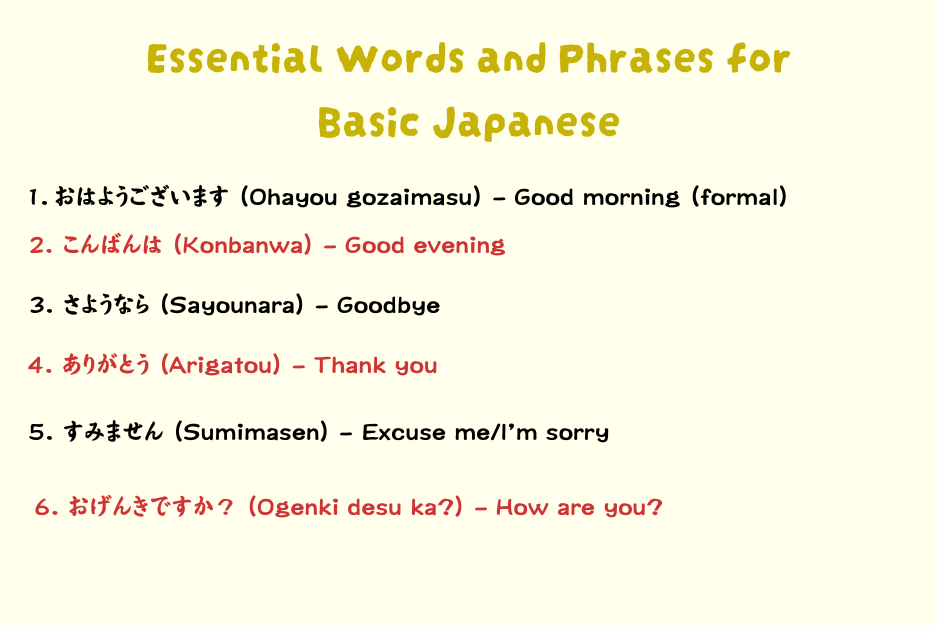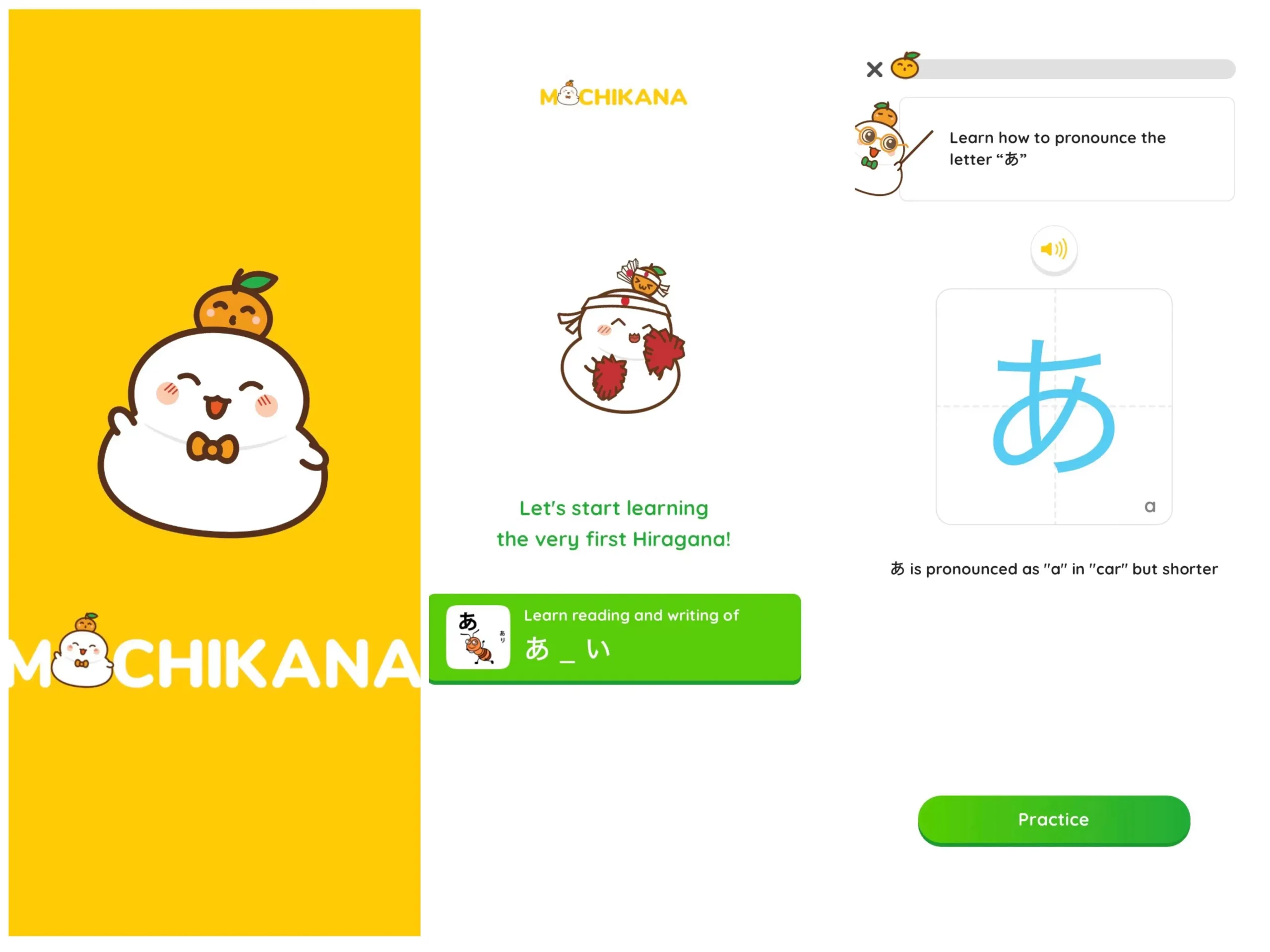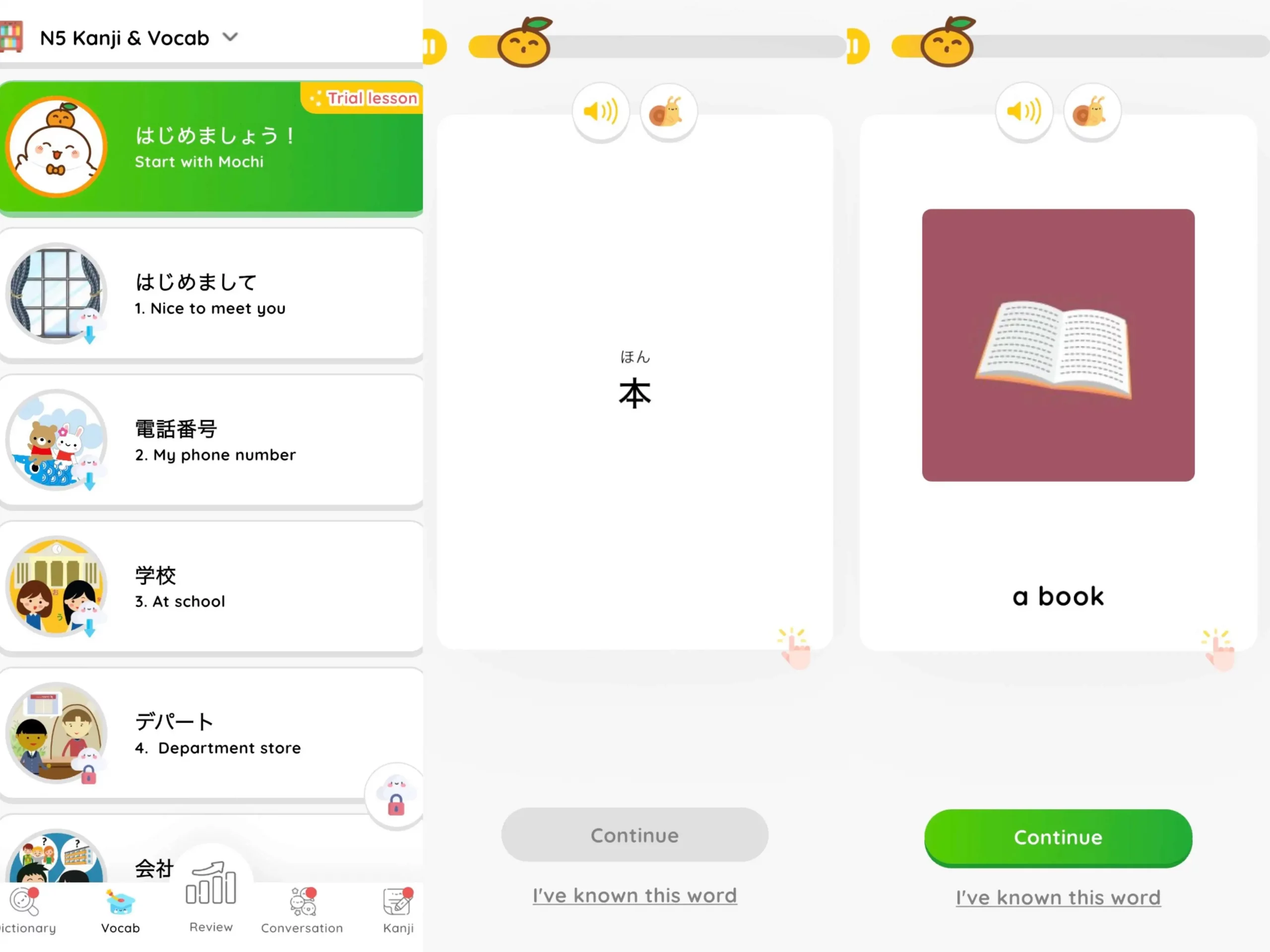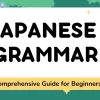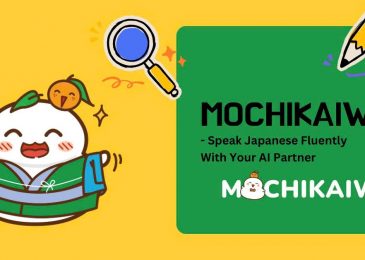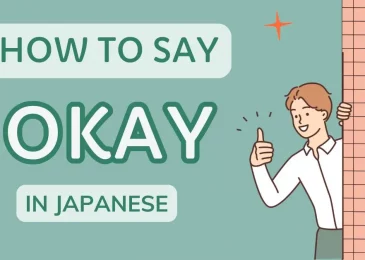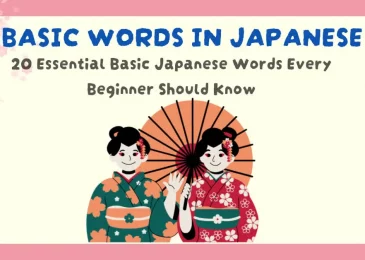Learning Japanese can be a rewarding journey, especially when you start with the most common words and phrases. By focusing on practical vocabulary, you can quickly build your confidence and engage in basic Japanese conversations. In this guide, we’ll explore essential Japanese words, phrases, and expressions for beginners that will help you navigate daily interactions effectively.
Why Learn Basic Japanese Words and Phrases?
Mastering basic Japanese vocabulary and phrases offers a range of benefits for beginners:
- Enables Practical Communication: Knowing keywords and phrases allows you to interact in common situations such as greetings, asking for help, shopping, or ordering food, even with minimal language proficiency.
- Builds a Strong Foundation: Familiarity with basic vocabulary provides a solid starting point for tackling more complex grammar and vocabulary as you progress.
- Boosts Confidence: Using even simple Japanese effectively in real-life interactions gives you a sense of achievement, encouraging further learning.
- Facilitates Cultural Connection: Language is a gateway to understanding culture. Basic Japanese helps you appreciate Japanese traditions, social norms, and customs more deeply.
- Enhances Travel Experiences: If you’re visiting Japan, knowing basic words can significantly enrich your travel experience by helping you navigate transportation, find restaurants, and interact with locals.
- Supports Writing System Familiarity: With Japanese relying on three writing systems—Hiragana, Katakana, and Kanji—learning basic words allows you to connect sounds to characters, making reading and writing less intimidating.
- Provides a Sense of Progress: Starting with manageable vocabulary makes the learning journey enjoyable and productive, helping you stay motivated as you achieve small, tangible milestones.
These reasons demonstrate why learning basic Japanese words and phrases is an essential first step for anyone embarking on the journey of mastering the language.
Essential Words and Phrases for Basic Japanese
Greetings and Polite Expressions
Politeness is central to Japanese culture, and knowing how to greet people appropriately is an essential first step in learning Basic Japanese. These expressions are used in various social settings:
- こんにちは (Konnichiwa) – Hello/Good afternoon
A versatile greeting used during the day.
- おはようございます (Ohayou gozaimasu) – Good morning (formal)
- A polite way to greet someone in the morning.
- こんばんは (Konbanwa) – Good evening
- Use this greeting in the evening hours.
- さようなら (Sayounara) – Goodbye
- A formal farewell for longer separations.
- ありがとう (Arigatou) – Thank you
- Express gratitude informally.
- すみません (Sumimasen) – Excuse me/I’m sorry
- Useful for apologizing or politely getting someone’s attention.
- おげんきですか? (Ogenki desu ka?) – How are you?
- A polite way to inquire about someone’s well-being.
Useful Japanese Phrases for Shopping
Shopping in Japan is a delightful experience, and knowing these phrases will help you navigate markets, stores, and malls:
- いくらですか? (Ikura desu ka?) – How much is this?
- Use this to ask about the price of an item.
- これをください (Kore o kudasai) – I’ll take this.
- Say this to indicate that you want to buy an item.
- やすいですね (Yasui desu ne) – It’s cheap, isn’t it?
- A useful phrase when you find a good deal.
- たかいですね (Takai desu ne) – It’s expensive, isn’t it?
- Use this when commenting on high prices.
- カードで払えますか? (Kaado de haraemasu ka?) – Can I pay with a card?
- Ask this to check if credit cards are accepted.
- レシートをください (Reshiito o kudasai) – Please give me the receipt.
- Handy for keeping track of your purchases.
- サイズがありますか? (Saizu ga arimasu ka?) – Do you have this in a different size?
- Use this when shopping for clothes or shoes.
Food and Drinks
Japanese cuisine is world-renowned, and knowing these words will make dining experiences much more enjoyable:
- たべもの (Tabemono) – Food
- A general term for anything edible.
- のみもの (Nomimono) – Drink
- Refers to beverages of all kinds.
- みず (Mizu) – Water
- Essential for ordering water at a restaurant.
- おちゃ (Ocha) – Tea
- A staple drink in Japanese culture.
- ごはん (Gohan) – Rice/Meal
- Refers to cooked rice or meals in general.
- おいしい (Oishii) – Delicious
- Use this to compliment food.
- おなかがすいた (Onaka ga suita) – I’m hungry.
- Perfect for expressing hunger.
- おなかがいっぱい (Onaka ga ippai) – I’m full.
- A polite way to say you’ve had enough to eat.
Everyday Words
These words are essential for navigating daily life in Japan:
- いえ (Ie) – House
- Refers to a home or residence.
- がっこう (Gakkou) – School
- A word commonly used when talking about education.
- せんせい (Sensei) – Teacher
- A respectful term for educators or professionals.
- ともだち (Tomodachi) – Friend
- A word to describe someone you value.
- くるま (Kuruma) – Car
- Useful for discussing transportation.
- ひこうき (Hikouki) – Airplane
- Essential for talking about travel.
- おかね (Okane) – Money
- A fundamental term for shopping or budgeting.
Expressing Emotions in Japanese
Talking about your feelings is important in any language. These words help you express your emotions in Basic Japanese:
- うれしい (Ureshii) – Happy
- Use this to express joy or delight.
- かなしい (Kanashii) – Sad
- A word to describe sorrow or sadness.
- たのしい (Tanoshii) – Fun
- Perfect for describing enjoyable experiences.
- つかれた (Tsukareta) – Tired
- Use this to indicate exhaustion.
- こわい (Kowai) – Scared
- Express fear or nervousness with this word.
- いらいらする (Iraira suru) – Frustrated
- A word for describing irritation.
- あんしんする (Anshin suru) – Relieved
- Use this when you feel reassured or at ease.
How to Learn Basic Japanese Vocabulary Effectively
To make the most of these words and phrases, follow these tips:
- Practice Daily: Spend at least 10–15 minutes each day reviewing and using new vocabulary.
- Use Flashcards: Tools like MochiKana can help you master Hiragana and Katakana.
- Engage in Conversations: Practice speaking with language partners or native speakers.
- Immerse Yourself: Watch Japanese shows, listen to music, or play games to reinforce your learning.
Enhance Your Learning with MochiKana and MochiKanji
When learning Japanese, mastering its writing systems – Hiragana, Katakana, and Kanji – is one of the most essential and challenging steps. MochiKana and MochiKanji are two apps specifically designed to help learners overcome these hurdles with engaging, effective, and structured learning methods. Here’s how each app supports your journey:
MochiKana: Your Foundation for Hiragana and Katakana
MochiKana is tailored for beginners to build a strong foundation in Hiragana and Katakana—the essential building blocks of Japanese. The app focuses on making learning simple, enjoyable, and effective.
Key Features of MochiKana
- Spaced Repetition Flashcards:
- Ensures long-term retention by revisiting characters at optimal intervals.
- Perfect for reinforcing both recognition and recall of each Kana.
- Interactive Practice
- Encourages users to combine characters into words, helping learners connect individual Kana with real vocabulary.
- Progress Tracking
- Allows learners to monitor their improvement and identify areas for more focus.
- Gamified Learning
- Keeps you motivated with fun, engaging elements like rewards and progress milestones.
Benefits for Learners
- Efficient Memorization: Spaced repetition helps learners retain knowledge effectively without overwhelming them.
- Confidence Boost: Structured lessons ensure you’re ready to move on to more complex topics like grammar or Kanji.
- Fun and Motivating: The app’s design makes learning enjoyable, reducing the stress often associated with memorization.
MochiKanji: Mastering Kanji Made Simple
Kanji is often regarded as the most difficult aspect of Japanese, but MochiKanji simplifies this process with a systematic and user-friendly approach. It’s designed for learners at all levels, providing tools to make Kanji learning accessible and less intimidating.
Key Features of MochiKanji
- Extensive Characters: Covers thousands of Kanji characters and vocabulary words, catering to all levels from beginner (N5) to advanced (N2)
- Spaced Repetition System: Utilizing a proven Spaced Repetition & Golden Time, MochiKanji reinforces Kanji at optimal intervals to enhance long-term memory retention.
- Structured Learning Path: MochiKanji provides a clear roadmap for learning Kanji, guiding users from N5 to N2 levels.
- Interactive Writing Practice: The app includes diverse writing exercises that follow the correct stroke order, aiding in long-term memorization and proper writing techniques.
- Integrated Vocabulary Learning: Users can learn Kanji alongside relevant vocabulary, promoting a deeper understanding and practical application of the language.
- Progress Tracking: MochiKanji monitors your learning journey, highlighting mastered Kanji or vocabulary and identifying areas that require additional practice.
These features collectively make MochiKanji a robust tool for mastering Kanji effectively and efficiently.
Benefits for Learners
- Systematic Learning: The thematic grouping helps learners focus on the most relevant Kanji first.
- Time Efficiency: Spaced repetition minimizes wasted time on overlearning familiar Kanji while reinforcing weaker areas.
- Achievable Goals: Clear progress tracking makes even the vast world of Kanji feel manageable.
Why Choose MochiKana and MochiKanji?
Together, MochiKana and MochiKanji provide a seamless and complementary learning experience:
- For Beginners: MochiKana helps you confidently master Hiragana and Katakana, preparing you for more advanced Japanese learning.
- For Progressing Learners: MochiKanji offers a step-by-step approach to tackling Kanji, ensuring you stay motivated while advancing your skills.
- Flexible and Engaging: Both apps are designed to fit into your daily routine, making Japanese learning productive and enjoyable.
- By incorporating these apps into your study routine, you can build a strong foundation and tackle even the most challenging aspects of the Japanese language with ease and confidence.
Conclusion: Start Speaking Basic Japanese Today
Learning Basic Japanese is a rewarding journey, and these common words and phrases will provide you with the confidence to navigate daily interactions. Whether you’re greeting someone, shopping, or expressing your emotions, this vocabulary is your key to unlocking Japanese communication.
Pair your learning with tools like MochiKana and MochiKanji to make mastering the language enjoyable and efficient. With regular practice and exposure, you’ll soon find yourself speaking Japanese naturally and confidently. がんばって!(Ganbatte!) – Good luck!

